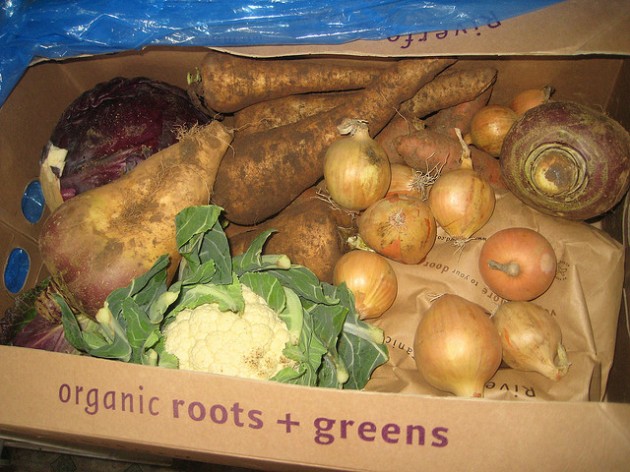Today we’ve got a ‘thoughtful’ piece for you. Its author, Mya Wilke, is a recent transplant to Boston who began her career in government and social service. A few offices and two organic farms later, she decided to change career paths and pursue work in sustainable food production.
Below, Mya writes about how our shopping choices — namely, organic delivery services — grow the infrastructure for local food and aid small organic farmers who would like to reach more consumers but have very little time and few resources to put into marketing or sales.
We plan on hearing from Mya again soon, on topics ranging from the new memoir “Chicken and Egg” to the revival of old-fashioned farming tools. Til then, read on.
Mya Wilke
PRK Guest Contributor
Organic delivery services are a relatively new way for consumers to access local organic produce. The immediate difference between buying produce from an organic delivery service and buying it at a farmers market, specialty grocery store or through a CSA subscription is convenience: organic groceries are delivered right to your doorstep.
Behind the scenes, organic delivery services and similar intermediaries (such as farmer-owned co-ops) can play an important role in developing the infrastructure for local food. Such intermediaries often provide much-needed financial stability to local farmers who prefer to sell wholesale, thereby encouraging local farmers to expand their businesses.
As in many metropolitan areas, organic delivery services are starting to pop up all over Boston. The largest by far is Boston Organics, founded by Jeff Barry in 2002. Barry earned his Masters degree in environmental economics from Tufts and then started Boston Organics after using a similar delivery service while living in San Francisco.
Boston Organics allows customers to choose from nineteen different produce boxes – which vary in size and percentage of fruit/vegetable mix – that are delivered to their preferred location (often home) on a weekly basis. From week to week, the exact type of fruits and vegetables may vary, but customers are able to identify produce that they never wish to receive. Customers subscribe to the service, but can cancel at any time.
“The subscription element allows us to work with local growers proactively to help grow the local infrastructure [for local food],” says Barry. His business accomplishes this by a) paying local farmers fair prices for their products, and b) providing farmers with stability by making agreements to buy produce before it is actually grown.
“Generally speaking, large-scale grocery chains are not going to pay the prices that are necessary for a small local farmer to stay in business,” explains Julie Rawson, Executive Director of Northeast Organic Farming Association – Massachusetts Chapter (NOFA/Mass). NOFA/Mass. works to support local organic growers and educate the general public about the benefits of local organic growing systems.
The owner of a small organic farm herself, Rawson is well aware of the challenges that local organic farmers face. She explains that small New England farmers can’t compete with the economy of scale that larger farms have, for example, in California. Therefore, it is usually cheaper for grocery chains to truck in produce from other parts of the country, rather than buy the same product from local New England farmers.
What intermediaries like Boston Organics are able to do is pay local farmers a fair price for their products and sell it to consumers who are willing to pay those slightly higher prices. It also makes business sense for Boston Organics to source food locally due to the rising cost of fuel.
Secondly, intermediaries can provide stability to local farmers by agreeing to purchase a set amount of produce in advance. The subscription element of Boston Organics allows Barry to predict the level of demand that he will have with relative certainty. “That’s why last week, I was able – with confidence – to tell a farmer that we can commit to buying 6,000 lbs. of carrots, 2,000 lbs. of watermelon radishes and 3,000 lbs. of parsnips for the upcoming season.”
Emphasis should be placed on “can provide stability” because some intermediaries back out of agreements with farmers. Barry explains that “for all the best intentions of grocery stores and restaurants, it’s just more tricky for them to [make advance arrangements] with a high level of confidence knowing that, ultimately, [business] is really dependent on the demand that the grocery store and restaurant is going to get.”
While farmers markets and CSAs play an essential role in connecting local farmers and consumers, not every farmer wants the administrative responsibilities involved in such arrangements. Similarly, not every consumer has the time to shop at farmers markets, and CSAs are sometimes too much of a commitment. Says Barry, “I think there’s always going to be a need to have intermediaries like Boston Organics help bridge that connection.”
Organic delivery services aren’t better than CSAs, farmers markets and grocery stores that carry local produce. They simply provide another way for consumers to access local food in a responsible way that benefits local farmers. So, if the convenience of an organic delivery service appeals to you, ask about the origin of the food they deliver. Chances are that using their delivery service benefits local farmers.


There is a great new delivery service on the South Shore: http://southshoreorganics.com/ I love them and the convenience factor is huge. As a single person, I found that CSAs often didn’t have “single shares” or only offered them in the city. SSO recognizes that single people live everywhere, and I’m very glad to be able to support them.